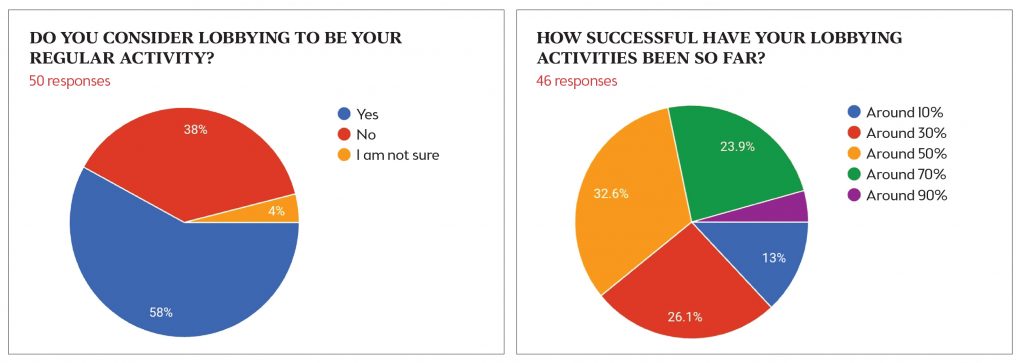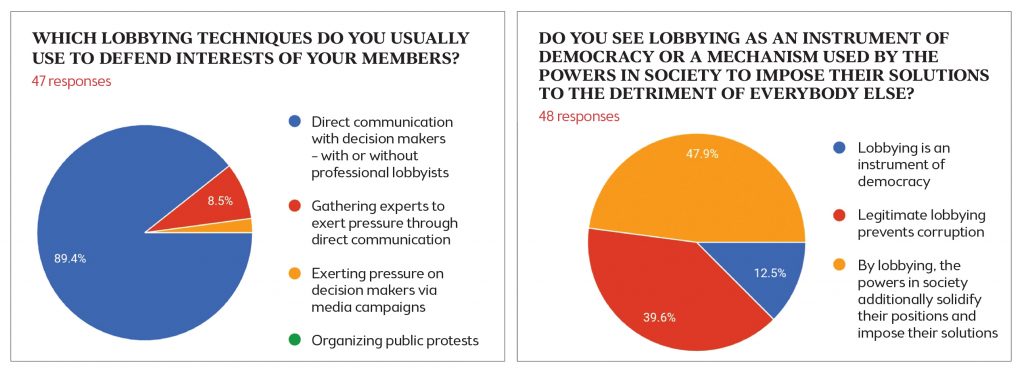Lobbying is an important segment of democracy, as long as it takes place in a legal, legitimate and ethical manner.
In Serbia, the Law on Lobbying came into force in 2019, and it regulates the conditions and manner of lobbying, as well as the lobbying rules. The law defines that every lobbyist is obliged to prevent the occurrence of harmful consequences for the public interest and that they have to act in accordance with the principle of integrity during lobbying activities in a legal, transparent, responsible and ethical manner. The law also prescribes a rule that lobbyists and those who are lobbied have to report to the Anti-Corruption Agency about meetings and contacts with politicians and other public officials. However, the financial compensation for lobbying activities is not public information and lobbyists are not obliged to reveal their fees to the state authorities, nor to the Anti-Corruption Agency during the lobbying process.

According to the Republic of Serbia’s Law on Lobbying, lobbying is defined as an activity that influences state bodies, autonomous provinces and local self-government and public bodies founded by the state of Serbia in the process of passing laws, other regulations and general acts in order to pursue the interests of the beneficiaries of the lobbying process in accordance with the law. An official or appointed person is prohibited from being a lobbyist in the activity in which they were engaged as a public official for at least two years from the termination of office term. Lobbying can be performed by a natural person who is registered with the Register of Lobbyists, as well as a company that is registered with the Register of Legal Entities that perform lobbying. According to the Law on Lobbying, foreign chambers of commerce are considered unregistered lobbyists and can lobby only for the interests of their members. It remains to be seen how lobbying activities in Serbia will really work.
It is important for Serbia that the Law on Lobbying was passed and that the first lobbyists were appointed. All of that is a result of the long-term efforts of the founders and members of the Serbian Lobbying Association, as well as its President Nenad Vuković during whose mandate the law was passed.
As a small country with a developing economy, we should also keep in mind the situation in Europe regarding the lobbying profession. According to the report compiled by Transparency International EU, published in September 2019, Brussels is the second lobbying capital in the world after Washington, D.C. At least 48,000 lobbyists work at the centre of the EU in organizations that want to influence the institutions and decisions of the European Union, and 7,500 of them are accredited to have access to the European Parliament. It is estimated that almost 12,000 organizations in the European Union have a total annual lobbying budget of 1.8 billion euro. These data indicate that Serbia should have professional lobbyists in its ranks too who will be able to act on the international level, which is not prescribed by the current law.

“Lobbying is an important segment of democracy, as long as it takes place legally, legitimately, and at best, ethically. Unfortunately, despite many regulatory and self-regulatory efforts, there have been quite frequent abuses in practice which justify the negative perception that the public has of this phenomenon. It is difficult to recognize positive trends either in Europe or in the United States when it comes to this,” said Professor, Boris Cizelj, PhD, and Professor Fazli Mehmet, PhD, who are engaged in research of the lobbying profession. The organization Corp Watch, which promotes the importance of environmental, social and human rights, while highlighting the responsibility of multinational companies for their actions, says that there is a strong belief that the media have become an instrument of political and corporate interests, that journalists are silenced and that media owner are closely associated with politicians, lobbyists and owners of corporations.
It is up to the future lobbyists of the Republic of Serbia to respect the Code of Conduct of participants in lobbying, as well as the principle of integrity, that is legality, transparency, responsibility and ethics when representing the interests of their clients. It is also important that, through their legitimate and legal actions, they contribute to curbing corruption and thus boost democracy and improve the conditions for the acceleration of economic processes. It is up to decision-makers, i.e. government representatives, to protect the public interest and not to subordinate it to the private one. It is encouraging to see that the number of ethical lobbying activities in the European Union is growing year-on-year. The book “Political and Economic Lobbying”, written by Balša Kašćelan and Duško Krsmanović, explains that the term lobbying itself has a negative connotation because it suggests that it is nothing more than bribing decision-makers or those who can influence them. They believe that lobbying is often seen as a secret coupling of government and lobbyists, i.e. as a procedure that takes place away from the public eye and everybody is reluctant to talk about. For many years in the United States, lobbyists have been mentioned as participants in numerous scandals. Such an image and reputation have spread throughout Europe together with the lobbying profession. The small number of lobbyists, who use illicit means, have caused an embedded negative opinion of the entire profession, and a large number of professionals find it difficult to correct these long-standing prejudices.

Research on the role of the media in lobbying
Public relations firm Media Skills has conducted a survey on the role that the media play in contemporary lobbying processes in Serbia by using a qualitative method on a sample of 50 respondents. The firm interviewed representatives of several foreign business associations and clubs, directors and owners of domestic and foreign companies and banks, PR agencies and embassy representatives. 58% of them answered that lobbying is one of their regular activities, while 38% said differently. More than half of the respondents think that they do not pay enough attention to lobbying, while 23% of them think that they have a serious approach to it. Only 13% said that their lobbying actions were successful. Most of the respondents do not have professionals to perform lobbying activities. Nearly 90% of respondents use direct communication with decision-makers to uphold the company’s interests while respecting the principles of ethical lobbying. 85% of them think that it is useful to use the media during lobbying activities in order to achieve appropriate results. Almost half of the respondents believe that lobbying is a mechanism by which the most powerful people in society impose their solutions to the detriment of everyone else.